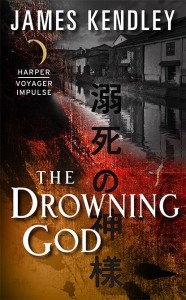Halloween Haunts: A Little Perspective by James Kendley
 I probably wouldn’t have the attention span to write about Japan if I still lived there. It’s just too damned interesting.
I probably wouldn’t have the attention span to write about Japan if I still lived there. It’s just too damned interesting.
I tried, of course, but every time I sat down to the keyboard during those eight years, I was processing all the amazing things happening around me every day. I had to be 15 years and half a world away to write the book I wanted to write, The Drowning God, and even then, I needed help to get the proper perspective.
First, a little about the book itself: To uncover modern Japan’s darkest, deadliest secret, Detective Tohru Takuda must face a living nightmare from his childhood, The Drowning God.
Few villagers are happy when Takuda comes home to investigate a foiled abduction, and local police enlist powerful forces to shut him out. When Takuda sacrifices his career to solve the string of disappearances in the grim and backward valley of his youth, he finds that more than a job or even family honor is at stake. Behind the conspiracy lurks the Kappa, a monstrous living relic of Japan’s pagan prehistory. Protected long ago by a horrible pact with local farmers and now by coldly calculating corporate interests, the Kappa drains the valley’s lifeblood, one villager at a time.
Takuda and his wife, Yumi, are among the few who have escaped the valley, but no one gets away unscarred. When Takuda digs into the valley’s mysteries, Yumi’s heart breaks all over again. She wants justice for her murdered son, but she needs an end to grief; even if Takuda survives the Kappa, the ordeal may end his marriage.
With Yumi’s tortured blessing, Takuda dedicates his life to ending the Drowning God’s centuries-long reign of terror. He can’t do it alone; a laconic junior officer and a disarmingly cheerful Buddhist priest convince Takuda to let them join him in the final battle, where failure means death—or worse. The journey of these three unlikely warriors from uneasy alliance to efficient team turns The Drowning God’s mystery into an adventure in friendship, sacrifice and courage.
All pretty straightforward, once we get down to the story. The thing is, it’s hard to get to the story if you’re bogged down in Japan itself. There are very few developed countries as different as the United States and Japan. When portraying Japan for a U.S. readership, there’s too much to get wrong, too much to get right, and too much distraction — at least while you’re in the middle of it.
Japan is as strange and contradictory and confusing as any other country (including yours). Everyday processes and interpersonal exchanges can be loaded with hints about status, dependencies, and bygone tradition. While I was there, practically everything I tried to write about Japan hinged on exposition about the nuances of behavior, aesthetics, and divergent expectations that I saw all around me. Every time my characters spoke, they were either repeating the lessons I had learned that day (when I was exhausted and on autopilot), reaffirming my prejudices (when I was just plain lazy), or defying my preconceived ideas of Japanese culture (when I was Making Stuff Up).
The Drowning God was going to be different. Once I’d been out of the country a few years, I set out to write a paranormal thriller in which the words, thoughts, and deeds of my human and inhuman characters would stem from perfectly recognizable motivations. No one was going to be a mystery of the Orient. No one was going to commit hara-kiri to save family honor. No one was going to lose face. Just folks.
While I was busy doing that, my fascination with Japan completely blindsided me.
The Drowning God was one of 30 projects selected out of 4,500+ novels submitted to Harper Voyager’s digital portal for unagented novels.
Good,” says I, brushing off my hands. “That’s done.”
That’s until I got the edits.
The fact is, some of the things I found fascinating about Japan are not things you might care about. Likewise, some of the things I found fascinating about The Drowning God do not help you enjoy the story. Thanks to a sharp editor, Kelly O’Conner at HarperCollins, here are a few of the things you will NOT read in final version of The Drowning God.
• An extended analogy likening Japanese financial conglomerates (zaibatsu) to the human body. Even now, I must restrain myself from explaining more because it was so damned clever.
• A subplot involving a lovely secretary/assassin who confounds the reader’s expectations about Japanese office workers. Social commentary aside, it was the spiciest, most manga-like bit of the book (she put the ass in assassin), but it did very little to advance the story. She had to go.
• A subplot involving a grizzled older detective in the pay of an evil corporation. It just belabored the point about the ubiquitous control of the major corporations, and its inclusion pushed the character load toward Dickensian complexity. He had to go.
 • An extended explanation of how local authorities bureaucratically conceal the systematic murders of their neighbors in a small, rural valley. This bit involved forged personal seals, switched postal codes, family registers, and a 3,000-key, clutch-driven Japanese typewriter. If I actually released this ingenious plan in its entirety, the Japanese countryside could be decimated. Far too dangerous not to whittle it down.
• An extended explanation of how local authorities bureaucratically conceal the systematic murders of their neighbors in a small, rural valley. This bit involved forged personal seals, switched postal codes, family registers, and a 3,000-key, clutch-driven Japanese typewriter. If I actually released this ingenious plan in its entirety, the Japanese countryside could be decimated. Far too dangerous not to whittle it down.
• More fake Japanese Buddhism than you probably ever wanted. As reverent as I tried to be, The Drowning God’s Buddhism is about as genuine as The Da Vinci Code’s Catholicism. That’s really what we all want from a paranormal thriller, but a little goes a long way. Cuts were in order.
Once more, a little perspective has helped. What’s left is a lean, taut paranormal thriller that will, I hope keep you on the edge of your seat. And I hope I’ve learned my lesson as far as what I think would be Japanese intrigue.
Until I get the edits for the sequel…
TODAY’S GIVEAWAY: James Kendley is offering one ebook copy of The Drowning God. Enter for the prize by posting in the comments section. Winners will be chosen at random and notified by e-mail. You may enter once for each giveaway, and all entrants may be considered for other giveaways if they don’t win on the day they post. You may also enter by e-mailing membership@horror.org and putting HH CONTEST ENTRY in the header.
JAMES KENDLEY has written and edited professionally for more than 30 years, first as a newspaper reporter and editor, then as a copy editor and translator in Japan (where he taught for eight years at private colleges and universities), and currently as an educational publishing content wrangler living in northern Virginia. He has a taste for the macabre, and he hopes you do, too!




Congratulations on your novel being selected and published by HarperCollins. I’m fascinated with Japan and its culture, including its rich history of ghosts, demons, and other unworldly creatures. Wishing you many sales!
Interesting sounding story… I’m hoping to visit Okinawa someday. I have family roots there.